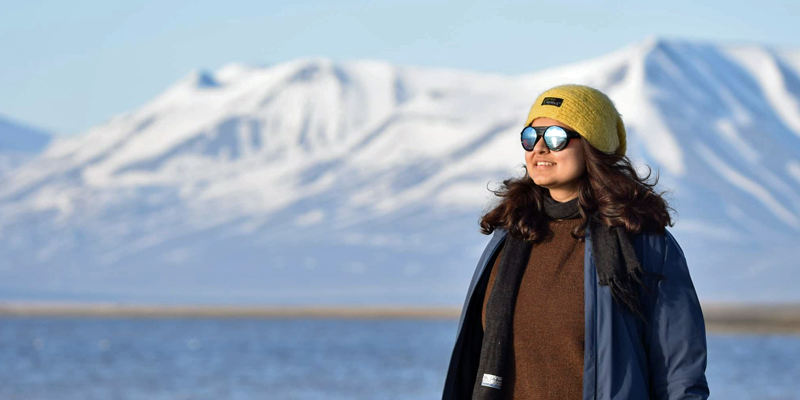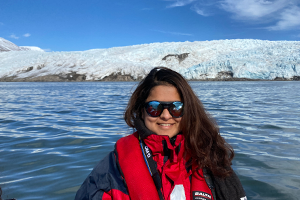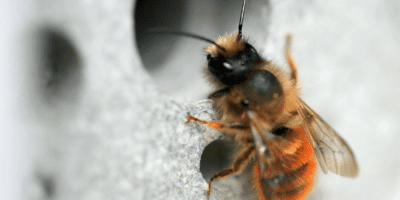Shalaka Patil is an Arctic microbiologist working as a PhD researcher at the University of Bergen, Norway in collaboration with University Centre in Svalbard (UNIS) and UiT, The Arctic University of Norway, investigating Arctic permafrost and ice-hills, known as pingos. Shalaka’s research explores microbial warfare in global climate change, which has become a major concern. She has been interested in microbiology from an early age, completing her schooling and undergraduate and master’s degrees in her native India before moving to Norway for her PhD.
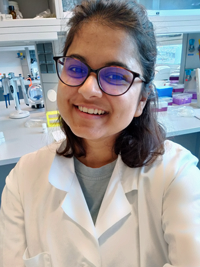
“I think women have a perspective to notice things at the micro-level in all instances of life. Therefore, it would be of great support to build a platform that can involve diversity of thought to create enthusiasm and awareness about the microbial world.”
Curiosity for microbiology
I have wanted to do biology since I was in school in India for two reasons: I’m not very good at maths, but I’ve also always been interested in molecular biology as well. My mum is a botanist, so she has also been a great supporter of my study of this subject.
During my bachelor’s degree, we had core subjects and two optional modules — biotech or microbiology. I decided to go with the latter as that is of more interest to me. Not everyone knows how fascinating microbiology can be but I became very curious while I was studying.
Later on, during my master’s degree, I had a brilliant professor who taught us about extreme climates and how microbes survive there. It was then I knew that’s the subject I wanted to research. (In India, we have different entrance examinations to get into a research career, and I managed to qualify while I was working as a junior researcher. This was a great opportunity for me because I had just finished my master’s degree.)
The first thing I worked on within the research field was anaerobic microbiology. These anaerobic microbes survive without oxygen, and they are one of the most challenging parts of microbiology to study. Anaerobic microbes produce methane gas, which is responsible for global warming.
I did an internship with an eminent scientist in India who worked with the bacteria isolated from Antarctica. That motivated me to get a career into what I’m doing today in Arctic microbiology.
Moving to Norway and experiencing life in the Arctic
While I was a junior researcher in India, I was actively looking for PhDs. My parents are great supporters of me taking a PhD, especially my mum, she would send me loads of links to see if any of them interested me. That is how the PhD I am currently taking at the University of Bergen, in Norway, came up. The process was very straightforward, I made an application, had an interview, and was shortlisted.
When I started the project, I felt quite fortunate to get into this area because it is something I had always wanted to do. Finally, I am doing what I told my friends five years ago that I wanted to study extreme environments.
Coming to Norway was my first-ever international trip, and it’s such a beautiful place to live. I do my fieldwork in the Svalbard area, near Longyearbyen, so experiencing life in the Arctic, getting to explore glaciers, and doing the fieldwork is super exciting for me.
At the moment, I manage everyday life by talking in English, but I’m learning Norwegian because I would like to spend some more years in Norway if I get the opportunity and learning a new language helps in understanding the culture too. I feel it’s a very good thing to be able to share the story of my work with others because as researchers we want other people to know what we are doing.
I’m very pleased to work with a female supervisor. I always wanted someone to be my role model, and she is the perfect person. She encourages and gives me the flexibility to work on my project.. That’s something I’ve been incredibly grateful for through years of working with her.
Battling the on-and-off pandemic
I’m about to finish my PhD in a few months, and it’s strange that I have lost one year of my PhD because of COVID-19.
I will never forget when I realised COVID was a big deal: I was up in Longyearbyen with my supervisor for our first field campaign for three weeks. Unfortunately, after three days of safety training, field survey, and final planning, it was declared that we had to head back home onto the mainland due to the closing of the institute and restrictions across borders. It was chaotic; the airport was incredibly crowded, and there was stress all around.
That’s how the journey of my PhD began. I was pretty stressed for a long time. How would I do justice to my project? I was left with no samples, the labs were closed, so it would be tough to continue my research. I tried to occupy myself by engaging in various activities. I’m glad I have mountains in the city where I live in Norway, so hiking was an option. I tried to read and write about my project, but I was entirely out of focus.
After a few months, I got special permission to go into the lab and work for some hours. At that time, I could relate to how it feels to be trapped when you are supposed to accomplish your goals.
Without thinking there would be an opportunity for fieldwork in 2021, I wrote to the Arctic Field Grant and ultimately I did receive funding.
Currently, we are in the third wave and still battling the on-and-off pandemic. It is bizarre that I will conclude my PhD thesis during a global pandemic. However, I have a few months left before I submit it, so I am trying to look at the positive side of everything.
Gender balance in polar research
I have noticed a high number of female candidates in polar research since 2019.
Last year, I spent my summer at the University Centre in Svalbard, doing an arctic microbiology course taught by my supervisor, and lived in student housing. To my surprise, the ratio of female to male students was relatively high. In my course, which demanded intense fieldwork and lab work, most female students enjoyed the field campaigns.
During my tenure as national committee coordinator at the Association of Polar Early Career Scientists (APECS), where I had an opportunity to assist committees of different countries, I noticed more women are involved in this field of study. I am not only talking about biology but also political and social sciences. This is my observation, but I see that gender balance is quite reasonable at higher career stages. However, women still struggle to climb to higher posts.
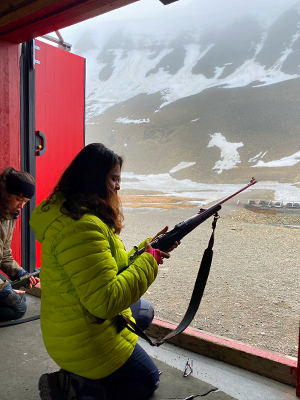
I receive emails from newly graduated girls asking for guidance on how they can step in polar research, which indicates that there are budding researchers willing to contribute.
Bringing together women in polar research
Women in the Arctic and Antarctic (WiAA) is an initiative set up by Danita Catherine Burke to bring together the women working in Polar regions and disseminate their work to the world.
I consider my work is aimed at microbiologists who still struggle to see the other side of this subject and fail to understand how fascinating life under a microscope can be. There is a lot of interdisciplinary work taking place. After being guided by glaciologists and geologists, I have gained more interest in understanding the science of glaciers and geology and their relation to microbes.
Polar regions are super unique, and they include something from every subject. I understood this after attending the Arctic Frontiers conference, a dream for any Arctic researcher. I had the opportunity to attend and present my work at this conference in January 2020.
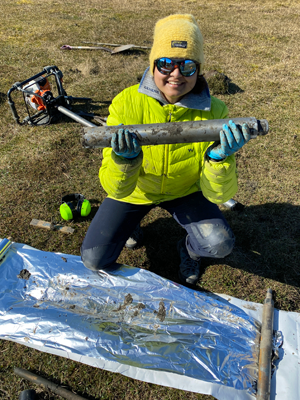
After my profile interview was published in WiAA this January, it has given me a sense of empowerment; I feel responsible for my contribution to the scientific community in Polar science. I have received messages from girls seeking guidance to enter this field of study, and requests to talk about my work over podcast episodes hosted by PhD candidates doing this outreach activity and contributing to the science society.
COP26, a challenge not all countries are totally on board with
The COP26 has been fruitful in fostering collaborations, accepting a common problem and attempting to resolve it. However, the outcomes for science and humanity aren’t entirely positive: World leaders were unable to reach a consensus, discussing specifics of the agreement. Furthermore, the fact that a few skipped the meeting only proves it’s a challenge we are still not totally on board with.
Increased deliberations coupled with a strong political will to institute pro-environmental laws might get this into motion, but seeing this from an academic point of view, interdisciplinary collaborations fostered many opportunities for graduates for coming years, which was positive. In contrast, I hope the opinion of the youth will be prioritised while designing future projects. Young people are taking the legacy to the next step.
Microbiology facts
Reading provides us with a new perspective, and being featured on Womanthology is a special experience for me. Here is a note to the readers: Please share this work with biology students; I wish to encourage and motivate them to explore the microbial world.
A quick insight about microbiology: Do you know the microscope was invented in the 17th century, but microbes have been living for billions of years, helping our environment in various processes? Now, if you look at the developed infrastructure for studying this subject, you can see it is remarkable because, to make this system work, researchers from physics, maths, chemistry, etc. have collaborated and worked together.
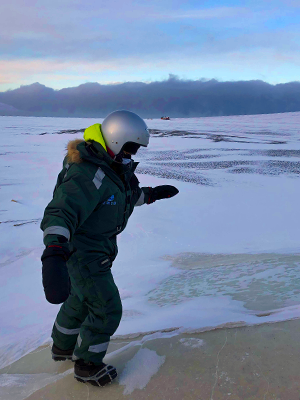
I think women have a perspective and an ability to notice things at the micro-level in all instances of life. Therefore, it would be of great support to build a platform that can involve diversity of thought to create enthusiasm and awareness about the microbial world.
Although I work in Arctic microbiology, I believe that this subject has enormous applications, from our regular yoghurt to help our gut microflora to the latest vaccine for COVID-19.
Taking microbes to the next level!
My current work has taken me to the next level of considering how engaging the science of microbes can be.
I am looking forward to concluding my PhD project with results published in scientific journals. I’d like to continue with post-doctoral studies within microbiology, taking an interdisciplinary approach, specifically from cold regions and frozen soils, using my current experience to design new projects. Along with my supervisor, I would like to maintain and build new strong collaborations in this area of research.

